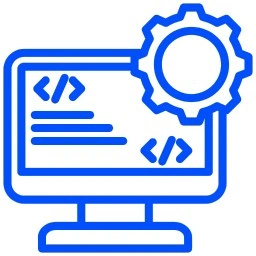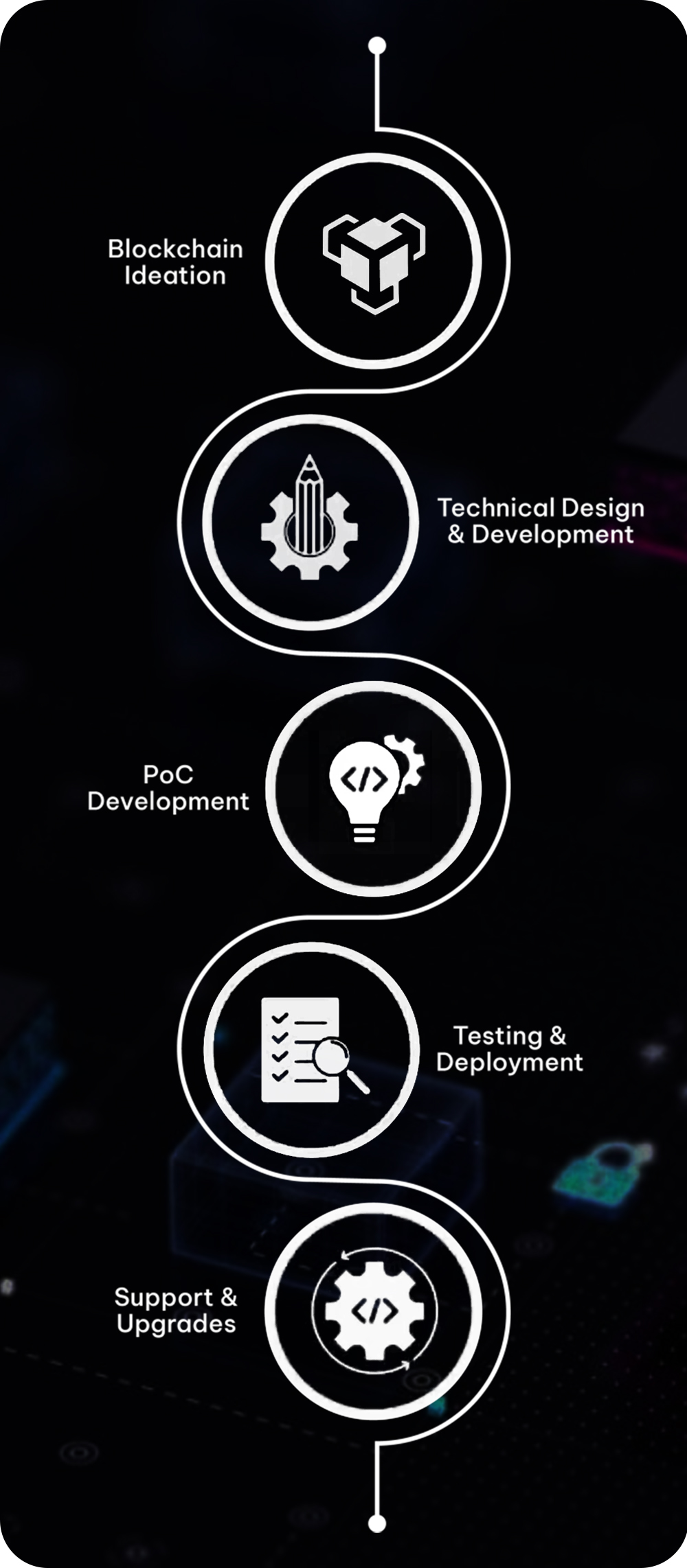Blockchain development
Building a secure, transparent, and immutable new age with blockchain technology
Building a secure, transparent, and immutable new age with blockchain technology
Building a secure, transparent, and immutable new age with blockchain technology
GEM specializes in delivering secure, scalable blockchain solutions that drive innovation and streamline business processes, with key offerings being:

We are experts in developing dApps that leverage blockchain’s decentralized nature, from decentralized finance (DeFi) solutions and gaming applications to smart contracts.

We develop private blockchains for businesses looking to enhance operational management. They are tailored for industries like supply chain management, where transparency, security, and efficiency are critical.
GEM’s blockchain development service have delivered tangible results that help businesses enhance operational efficiency, security, and transparency.


When implementing blockchain for supply chain management and other core business operations, businesses see remarkable improvement in transparency, since every transaction or movement is fully traceable and verifiable.
Adopting blockchain-based decentralized apps helps businesses become more agile and capable of innovating quickly, adapting to changing markets, and exploring new revenue streams.
Our blockchain development services help companies improve efficiency within supply chain operations by streamlining logistics and ensuring accurate, real-time data tracking.



You’re only one step away – Our representatives will contact you shortly via Email or WhatsApp/Kakao Talk/Line/Viber
Blockchain development has moved well past the stage of experimentation. Today, it’s powering real applications across finance, supply chains, identity systems, and more. As businesses explore how to apply it in practice, the focus has shifted toward building useful, secure, and scalable systems. This article outlines the core components of blockchain development, the types of services available, common use cases, and what to look for in a development partner. Let’s break down the landscape for teams looking to build with clarity and purpose.
Blockchain development refers to the process of designing, building, and maintaining systems that operate on blockchain architecture. These systems include decentralized applications (dApps), smart contracts, custom protocols, and infrastructure that leverages distributed ledger technology. Unlike traditional development, blockchain projects often involve immutable data structures, consensus algorithms, and token-based ecosystems.
The global blockchain technology market was valued at USD 31.28 billion in 2024 and is projected to grow to USD 1,431.54 billion by 2030. This scale of expected growth reflects rising enterprise adoption across industries, expanding developer ecosystems, and increased investment in decentralized infrastructure.
At its core, blockchain development combines software engineering with cryptography, network architecture, and economic modeling. It spans multiple layers, from protocol design to user-facing applications, requiring cross-functional expertise. As new platforms and frameworks continue to emerge, the field remains dynamic and highly specialized.
More about “Blockchain”: https://gem-corp.tech/category/blockchain/
Blockchain development spans multiple layers of technology, each with its own purpose and complexity.
These are the building blocks that shape how blockchains operate.
Distributed Ledger Technology (DLT)
Every participant in a blockchain network holds a synchronized copy of the ledger. This eliminates the need for a central authority and creates a shared source of truth.
Consensus Mechanisms
Blockchains rely on mechanisms like Proof of Work (PoW), Proof of Stake (PoS), and Delegated Proof of Stake (DPoS) to validate transactions and maintain agreement across distributed nodes.
Cryptographic Principles
Techniques like hashing, public-private key encryption, and digital signatures secure data and authenticate participants. These principles are core to trustless interaction in blockchain ecosystems.
These layers bring blockchain functionality to end users and developers.
Smart Contracts
Self-executing code stored on the blockchain. Smart contracts automate transactions and enforce rules without intermediaries, used widely in financial products, games, and DAOs.
Decentralized Applications (dApps)
Applications built on top of blockchain networks. They interact with smart contracts and often operate through browser-based interfaces or mobile apps.
Web3 Development
The interface layer that connects users with blockchains. Web3 libraries and SDKs (like web3.js or ethers.js) handle wallet integration, token interactions, and smart contract communication.
Building robust blockchain solutions requires a tailored stack of tools and technologies.
Common Platforms
Programming Languages
Full-Stack Development
Blockchain applications require more than smart contracts:
Each component plays a specific role in delivering decentralized solutions that are secure, scalable, and aligned with user needs. Mastery across these layers is what sets apart high-performing blockchain teams.
Blockchain development services cover the full lifecycle of building decentralized systems, from initial protocol design to deployment, integration, and long-term support. As blockchain moves deeper into enterprise and consumer applications, the demand for tailored services has grown.
Not every use case fits existing public platforms. Custom blockchain protocol development involves building a blockchain network from the ground up or modifying an existing open-source framework to suit specific business logic, governance models, or performance needs. This includes:
This service is often used by enterprises, consortiums, or platforms that require control over security, compliance, and data ownership.
Security remains a top concern in blockchain. Smart contract audit involves reviewing the source code of smart contracts to identify vulnerabilities, logic errors, and inconsistencies. This is followed by testnet deployment, performance testing, and mainnet deployment. A comprehensive audit includes:
Audit services are essential for DeFi protocols, NFT platforms, and any blockchain application involving monetary transactions or asset ownership.
Blockchain often needs to coexist with existing IT infrastructure. Integration services bridge blockchain networks with ERP systems, CRMs, IoT platforms, and traditional databases. This includes:
These services help organizations implement blockchain without disrupting current operations, especially in industries like logistics, healthcare, and finance.
Explore more: How Financial Industry evolves with Blockchain Technology?
Tokenization converts real or digital assets into blockchain-based tokens, making them easier to trade, track, or fractionalize. Services in this area include:
This service is widely used in gaming, digital art, real estate, and brand engagement initiatives.
Decentralized applications require thoughtful design to balance usability, security, and decentralization. dApp development services cover the entire architecture, including:
These projects demand coordination between blockchain engineers, frontend developers, and product designers.
Explore more: Web3 Development Security
After launch, blockchain systems need continuous improvement and monitoring. Maintenance services include:
Support teams work closely with product stakeholders to keep the platform reliable and aligned with changing requirements.
Blockchain technology is gaining traction across multiple industries as organizations look for more secure, transparent, and traceable systems. Here are five examples of how it’s being applied across retail, manufacturing, human capital management (HCM), education technology (edtech), and healthcare:
Retailers are using blockchain to track products from origin to shelf. Each step, from sourcing raw materials to final delivery, is recorded on a distributed ledger, giving both businesses and consumers verified insight into product provenance. This reduces the risk of counterfeits and improves accountability across global supply networks.
For example, global fashion and food brands have implemented blockchain-based traceability to meet sustainability goals and respond to regulatory pressures.
In manufacturing, blockchain helps record component histories, maintenance logs, and compliance certifications. This becomes especially valuable in sectors like aerospace or automotive, where traceability is tightly regulated. By storing production data on-chain, manufacturers can reduce disputes over quality, simplify audits, and react faster to recalls.
Blockchain also supports machine-to-machine transactions in smart factories, enabling automated recordkeeping across connected devices.
Enterprises are adopting blockchain to verify educational qualifications, certifications, and work history securely. This approach streamlines onboarding and reduces the risk of credential fraud. In industries with a mobile workforce, such as construction, logistics, or healthcare, blockchain helps track skill development and licensing across jurisdictions.
Some HR platforms are piloting decentralized identity systems that give employees control over their professional data.
Educational institutions are issuing blockchain-based diplomas and certificates that are tamper-proof and easily shareable. This helps learners maintain a permanent, verifiable record of their achievements, even as they move across jobs or geographies. On the platform side, edtech companies are experimenting with token-based incentives to encourage course completion and engagement.
Blockchain also opens the door to decentralized learning ecosystems, where credentials from multiple providers can be aggregated into a single learner profile.
In healthcare, blockchain is being tested for managing patient records, consent management, and data sharing between providers. By logging access requests and updates immutably, healthcare systems gain more control over how sensitive data is used. Patients can grant or revoke access to their records without going through intermediaries.
Blockchain also supports research by providing anonymized datasets with clear usage permissions, enabling collaboration without compromising privacy.
Choosing the right blockchain development partner involves evaluating how well a team can align with your business goals, deliver secure and scalable solutions, and support long-term product evolution.
A qualified partner should demonstrate proficiency across blockchain protocols and development environments. This includes:
Expertise in blockchain alone isn’t enough, look for a team that understands full-stack development, including front-end frameworks, backend integration, and node infrastructure.
Security should be embedded into every stage of the development process. Your partner should:
Given the irreversible nature of blockchain transactions, any overlooked vulnerability can lead to financial and reputational damage.
A credible blockchain partner should provide evidence of past work that aligns with your project scope. Look for:
Reputation matters. Explore client references, third-party reviews, and activity in developer communities.
Different projects require different delivery strategies. Your partner should be able to:
This clarity helps manage expectations, avoid scope creep, and focus on high-impact features first.
Blockchain projects often require collaboration across engineering, design, and compliance. Evaluate:
A well-structured team reduces friction and accelerates decision-making during development.
Blockchain systems require regular updates, especially when underlying protocols evolve. A reliable partner should:
Post-launch support is not optional, especially for platforms that handle transactions, identities, or user data.
Blockchain development intersects with evolving regulatory environments. Your partner should:
A thoughtful approach to compliance minimizes exposure to legal and operational risks over time.
GEM Corporation is a global IT service provider and consultancy, known for delivering high-impact digital solutions across sectors including retail, healthcare, finance, and manufacturing. With over 400 technology experts and a track record of 300+ successful projects, GEM combines deep technical capabilities with a customer-centric approach. Our teams operate across Japan, ANZ, the EU, the US, and beyond, supporting businesses through scalable software, data, and cloud strategies.
GEM’s blockchain development services focus on building secure, transparent, and business-aligned decentralized solutions. We design and deploy decentralized applications (dApps), smart contracts, and private blockchain networks tailored to operational needs. From DeFi platforms to supply chain transparency systems, our blockchain projects are engineered to drive agility and efficiency.
Explore more:
Blockchain development is reshaping how organizations approach transparency, automation, and data integrity. From smart contracts and dApps to integration with enterprise systems, the technology supports secure, decentralized operations across sectors. Success depends on the right technical foundation, a structured delivery model, and long-term support. GEM delivers full-spectrum blockchain services, tailored to business needs, backed by cross-industry expertise, and designed for measurable outcomes. Connect with us to explore how blockchain can advance your digital strategy.
